

You Tube Verbal Abuse 2. Helen Bonham Carter voices advert condemning verbal abuse in the home. Actor Helena Bonham Carter has lent her voice to an MTV ad on domestic abuse, reciting a passage about love from the book of Corinthians in the Bible.
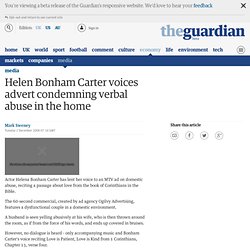
The 60-second commercial, created by ad agency Ogilvy Advertising, features a dysfunctional couple in a domestic environment. A husband is seen yelling abusively at his wife, who is then thrown around the room, as if from the force of his words, and ends up covered in bruises. However, no dialogue is heard - only accompanying music and Bonham Carter's voice reciting Love is Patient, Love is Kind from 1 Corinthians, Chapter 13, verse four. The TV ad ends with the strapline "If only you could see the damage words cause" and the word "bitch" etched into the woman's face. Bonham Carter recorded her vocal in a single take for the ad, which breaks tonight. The ad will air across MTV in the UK and across Europe as part of MTV's Staying Alive campaign. MTV will also make the ad available online and is considering running it in cinemas.
Verbal Abuse. Introduction Almost everyone has heard of, or knows of, someone who has been verbally abused.
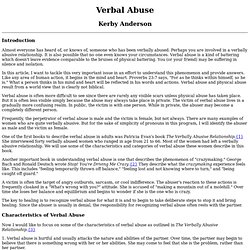
Perhaps you are involved in a verbally abusive relationship. Berit Ås: Master Supression Techniques. Introduction Nothing is as practical as good theory.
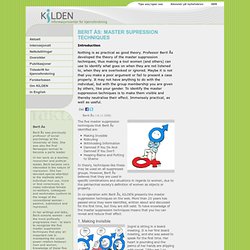
Professor Berit Ås developed the theory of the master suppression techniques, thus making a tool women (and others) can use to identify what goes on when they are not listened to, when they are overlooked or ignored. Maybe it is not that you make a poor argument or fail to present a case properly. It may not have anything to do with the individual, but with the group membership you are given by others, like your gender. To identify the master suppression techniques is to make them visible and thereby neutralise their effect. Berit Ås (14.11.2008) Berit Ås. Academic career[edit] Political career[edit] She also made important contributions to the feminist cause in Norway.
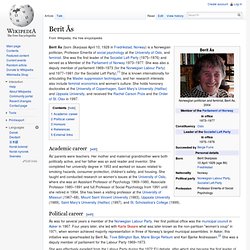
She led efforts to establish the Feminist University in Norway in the 1980s, and formulated five Master suppression techniques she claims are used against women in particular, though these may be used against other disadvantaged groups as well. She co-founded the Nordic Women's University in 2011.[3] Master suppression techniques. The Master suppression techniques is a framework articulated in 1945 by the Norwegian psychologist and philosopher Ingjald Nissen.[1] These techniques identified by Nissen are ways to indirectly suppress and humiliate opponents.
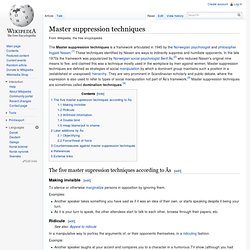
In the late 1970s the framework was popularized by Norwegian social psychologist Berit Ås,[2] who reduced Nissen's original nine means to five, and claimed this was a technique mostly used in the workplace by men against women. Double standard. A double standard is the application of different sets of principles for similar situations, or by two different people in the same situation.[1] A double standard may take the form of an instance in which certain concepts (often, for example, a word, phrase, social norm, or rule) are perceived as acceptable to be applied by one group of people, but are considered unacceptable—taboo—when applied by another group.
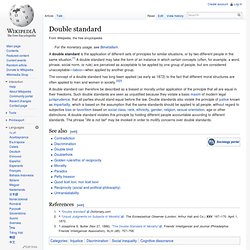
The concept of a double standard has long been applied (as early as 1872) to the fact that different moral structures are often applied to men and women in society.[2][3] A double standard can therefore be described as a biased or morally unfair application of the principle that all are equal in their freedoms. Such double standards are seen as unjustified because they violate a basic maxim of modern legal jurisprudence: that all parties should stand equal before the law.
See also[edit] Psychology abuse terms, concepts. Prev | Next | Contents ==== Double Standard MEANING: A standard that is applied strictly to one person but more leniently to another.
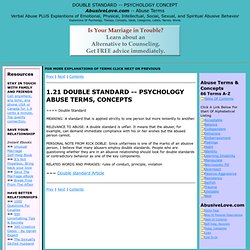
RELEVANCE TO ABUSE: A double standard is unfair. It means that the abuser, for example, can demand immediate compliance with his or her wishes but the abused person cannot. PERSONAL NOTE FROM RICK DOBLE: Since unfairness is one of the marks of an abusive person, I believe that many abusers employ double standards. RELATED WORDS AND PHRASES: rules of conduct, principle, violation.
Thirty-four examples of abusive behavior. Prev | Next | Contents ==== Some abusers will build you up and then tear you down.
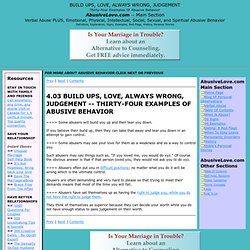
If you believe their build up, then they can take that away and tear you down in an attempt to gain control. ==== Some abusers may see your love for them as a weakness and as a way to control you. Such abusers may say things such as, "If you loved me, you would do xyz. " Of course the obvious answer is that if that person loved you, they would not ask you to do xyz. ==== Abusers often put you in difficult positions; no matter what you do it will be wrong which is the ultimate control. Abusers are often demanding and very hard to please so that trying to meet their demands means that most of the time you will fail. ==== Abusers have set themselves up as having the right to judge you, while you do not have the right to judge them.
Emotional Abuse. What is Emotional Abuse?

Abuse is any behavior that is designed to control and subjugate another human being through the use of fear, humiliation, and verbal or physical assaults. Emotional abuse is any kind of abuse that is emotional rather than physical in nature. It can include anything from verbal abuse and constant criticism to more subtle tactics, such as intimidation, manipulation, and refusal to ever be pleased. Emotional abuse is like brain washing in that it systematically wears away at the victim’s self-confidence, sense of self-worth, trust in their own perceptions, and self-concept. Whether it is done by constant berating and belittling, by intimidation, or under the guise of “guidance,” “teaching,” or “advice,” the results are similar.